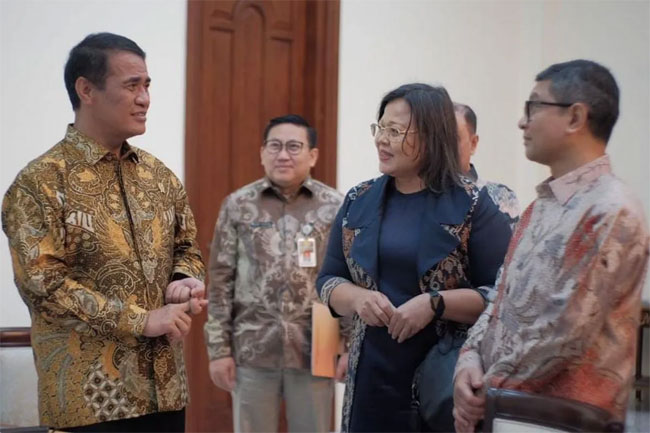By: Staff Writer
June 15, Colombo (LNW): Indonesia’s Agriculture Minister, Andi Amran Sulaiman, has called for closer agricultural cooperation with Sri Lanka, particularly in the coconut sector, to unlock greater value from one of Indonesia’s most abundant commodities.
Speaking in Jakarta during a meeting with Indonesian Ambassador to Sri Lanka, Dewi Agustina Tobing, and Minister Sulaiman emphasized the importance of “downstreaming” in agriculture — the process of converting raw commodities into higher-value finished products. Coconut, he noted, is a top priority due to Indonesia’s vast natural supply and the growing global demand for processed coconut products.
“Downstreaming agriculture is a key government strategy to increase value and global competitiveness of local products,” Sulaiman said, underscoring President Joko Widodo’s directive to capitalize on raw material-rich sectors like coconut.
The minister highlighted shifting global consumption patterns, particularly in China, where consumers are turning from dairy to coconut-based alternatives such as coconut milk and virgin coconut oil (VCO). “This global shift is a golden opportunity for Indonesia, as European countries can’t grow coconuts,” he added.
Currently, Indonesia exports around two million tons of raw coconuts annually, valued at Rp20 trillion. However, Sulaiman estimates that turning coconuts into processed goods could raise their export value to between Rp40 trillion and Rp60 trillion — doubling or even tripling current figures.
To advance this vision, Sulaiman is actively seeking international cooperation, with Sri Lanka emerging as a key potential partner. During the meeting, Ambassador Tobing explained that Sri Lankan companies possess sophisticated technology for processing all parts of the coconut — including the husk and shell — into high-value products.
“Several Sri Lankan firms are interested in investing in Indonesia’s coconut processing industry. Their expertise could help us significantly upgrade our downstream capabilities,” Tobing said.
The two officials also explored possible collaboration in the tea sector. Sri Lanka, globally recognized for its tea industry, is reportedly keen to invest in Indonesia’s tea processing to help boost the value of local production.
“Sri Lankan companies are looking at Indonesia’s tea as a promising area. With the right processing methods, we could significantly raise the export value of our tea products,” Tobing noted.
In addition to coconut and tea, rice production was also discussed as a potential area of bilateral cooperation. Indonesia’s recent achievements in rice output have caught the attention of Sri Lankan officials. Tobing said Sri Lanka’s president and key ministers have shown strong interest in partnering with Indonesia on food security initiatives.
“We showcased Indonesia’s rice success to Sri Lanka’s leadership, and their response has been highly enthusiastic. They view Indonesia as a global food hub and want to deepen collaboration,” she added.
As Indonesia pursues a more value-driven agricultural strategy, partnerships with countries like Sri Lanka — known for their agro-processing technologies — could play a crucial role in achieving economic transformation and improving export performance in the sector.

